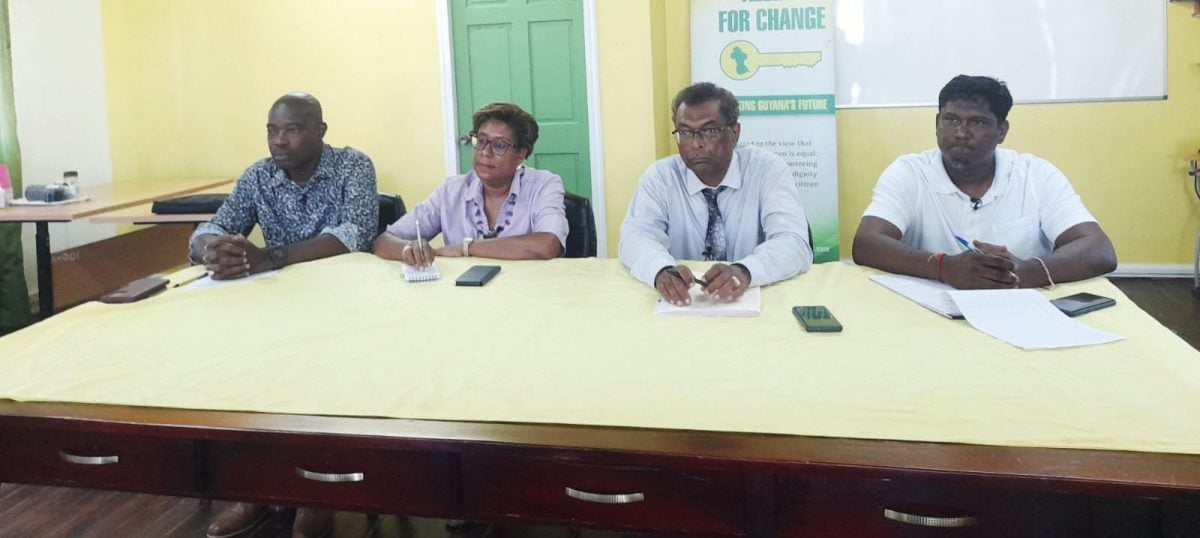By Joseph Allen
The system did not work for the 16-year-old who alleged that she was sexually assaulted by former minister of Local Government and Regional Deve-lopment Nigel Dharamlall, Head of the Alliance for Change (AFC) Khemraj Ramjattan has said.
Ramjattan made this remark at an AFC press conference, shortly after President Irfaan Ali remarked that the system had worked following a No Further Action statement from the complainant.
“All the state institutions would have bungled… this matter. It is a debacle. How could it be that the process worked, what process?” Ramjattan queried.
An investigation was launched following allegations made by the teenager that were originally contained in a letter to the President. Dharamlall was later arrested and released on $1 million station bail. He then requested and was granted leave to facilitate the investigation.
The complainant was in protective custody at a state agency.
Days after the file was submitted by the police for legal advice, the Director of Public Prosecutions (DPP) returned it, indicating to the police that there was need for more investigations to be conducted. The following day, the complainant indicated her unwillingness to proceed any further to the police, in the presence of one of her parents and a representative of the Child Care and Protection Agency. On the basis of this, the DPP said no further action would be taken.
Dharamlall subsequently resigned as minister and Member of Parliament. However, throughout the process, some civil society groups along with the opposition protested for him to be charged with rape.
Those sentiments were echoed by the AFC leader, who opined that there was enough evidence for the process to work. “After the girl give cogent and compelling evidence in the statement after she was taken into protective custody, which statements are the bases for any rape charges, sodomy charges and sexual grooming charge, we heard that more statements were wanted. For what? Obviously, there was complicity from some places to put pressure on the girl to make the same conclusion that we all arrived at ‘no further action’ and that is to say that the process worked,” he said.
Instead, he said it was just what the government and others wanted to happen.
“They told me that there was a protocol that independent lawyers can’t represent child victims. It’s a total lie because I have it here, the document, and the protocol. And, the protocol also indicated that what is in the best interest of the child must be the basis used for forensic interviews and what could be better than having an independent advisor for the child?” he asked.
He said the child was not where she should be but at another location that would not normally house child victims and he was even denied access to the brother when he was being interviewed, even though he was not the victim.
“United Nations Child Rights should come. When we were passing the Sexual Offences Act of 2010. Oh, they brought all the experts. They brought the experts to show us how, and explained to all of us, why they don’t bring the experts now so that they would do a review of the bungled [case]. Let them bring those experts here,” he said.
AFC member Cathy Hughes, who is the wife of the counsel for Dharamlall, and also a member of the AFC, supported a review of the system.
“The question that we should be asking is, … if tomorrow some other girl reports a similar situation with another individual, and we have heard of other similar stories, are we as a country in a better position to defend the rights of the victim?” she asked. “And, at the end of the day, if you look at the Sexual Offences Act where it specifically talks about ensuring that a victim doesn’t have to regurgitate over and over what took place, how is it possible that you don’t record the first statement but the exit statement you boasted you recorded? Does that make sense that on the day that she decides, supposedly, the third organisation had come in for her to repeat again what took place, three times in one day? That cannot be acceptable and for us to stop thinking that the government is not responsible for fixing this, is not good enough.”
Hughes also indicated that it is now on the government to fix things.
“In a normal society, the government of the day would want to be able to guarantee, almost, that were the same circumstances to emerge again today, tomorrow, next week, that if the system and the institution erred, that next time around that a better job would be done. And that is where the onus is on the government, to ensure the procedures taken by the child protection services, the police force and all the other entities that were involved in this situation are examined by an independent group and determine where we fell down, and ensure recommendations put on the table are implemented.”





